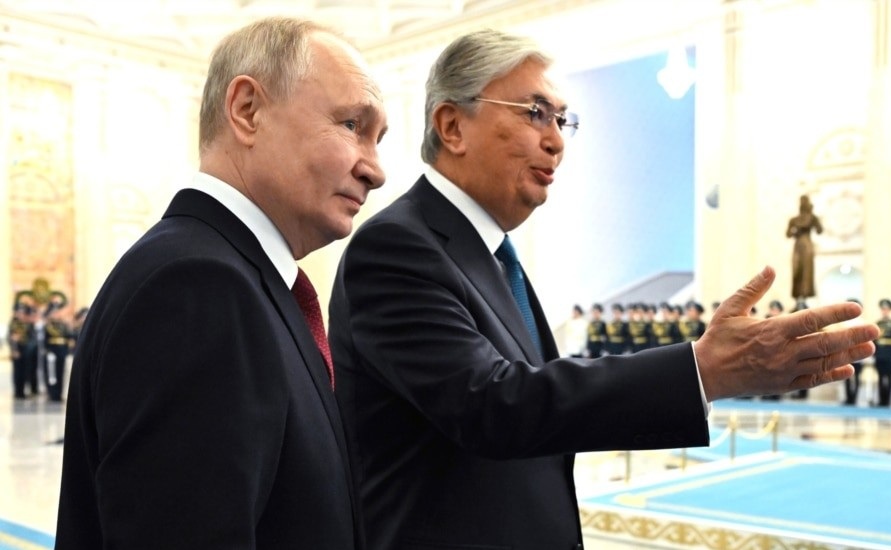Thorny relations between Moscow and Astana
Behind the reappearance of President Tokaev at the 9 May parade in Moscow are questions about the uneasy relations with Putin. According to some analysts, the disagreements over Ukraine are just 'smoke and mirrors'. But there are also those who claim that Russia is already targeting the more 'loyal' CSTO secretary Tasmagambetov to replace him.
Moscow (AsiaNews) - The unexpected presence of Kazakh President Kasym-Žomart Tokaev at the 9 May parade in Red Square has raised several questions about the relationship between Russia and Kazakhstan, which has been rather ambiguous and contradictory in the abundant year that has passed since the Almaty street protests of January 2022, the invasion of Ukraine and Russian claims on the northern Kazakh territories.
Tokaev has repeatedly distanced himself from Putin, even in direct and public meetings, but then reaffirmed his historical friendship with the Russians, which today brings several economic benefits to the Central Asian steppes.
The change of plans by the head of the Akorda, the presidential palace in Astana, hinted at the need to reaffirm its importance in relations with Russia and the stability of its role within the country, not only aligning itself with the other satraps in the region, but also denying the 'replacement' plans attributed to the Kremlin.
The Kazakh political scientist Akhas Tažutov wrote an article in Eurasia rewiew, in which he argues that Moscow is pushing a senior official, the current secretary general of the CSTO (the Eurasian military alliance) Imangali Tasmagambetov (to the right of Tokaev in the picture above ed.), as a possible alternative to Tokaev.
Kazakhstan has in fact adhered to international sanctions against Russia, even though it is the main way around them, and is in a delicate situation of conflict between East and West, which needs a more stable solution.
The disagreements between the two presidents over the war in Ukraine have at times seemed to be a game of sides, appearing to clash in order to cover Moscow's de facto control over the situation in Kazakhstan, where even Tokaev's 'great reforms' are accused by many of being nothing more than a smokescreen.
As Tažutov explains, 'Kazakhstan does not control internal information, from television to publications to the internet, which is in fact largely in Russian hands, defending the ruling elite to guarantee its own interests'.
According to the political scientist, this script is in the process of being overcome, and Moscow would like to transform Astana from a 'hidden partner' into a public and loyal ally, to be shown to the West as the true counterbalance to the 'satanic' Ukraine enslaved by the enemy.
Indeed, Kazakhstan cannot continue to exploit the ambiguities of the 'grey market' in favour of Russia for long, lest it incur secondary sanctions. The next step after the war, whatever the outcome, should be for Moscow the proclamation of the Unitary State with Belarus and Kazakhstan, the realisation of the new Eurasian empire.
This requires the replacement of Tokaev, a 'passing' figure to throw dust in the eyes, who has never attained the truly authoritative stature of an independent leader. According to Tažutov, the current CSTO secretary had long been considered 'the best possible heir to Nazarbayev, with strong support within the country, especially from the oil oligarchs of the western regions'. In fact, Tasmagambetov is also the only high-ranking official, apart from Tokaev, who is familiar with Kremlin hierarchs.
In addition to CSTO, analysts analyse the prospects of the SCO, the Shanghai Cooperation Organisation, in which Russia and China work together to ensure the security of Central Asia.
The war in Ukraine has also changed the balance in this area, where Russia has traditionally been dominant, while China's role is now becoming increasingly influential. Kazakhstan tries to keep on the edge of its 'multi-vector' policy and not tilt too much towards Beijing, or perhaps even Japan, but Russia still sees the need to reassert its protection over the whole region, starting with Kazakhstan.
04/02/2022 10:06
06/01/2022 09:40
24/06/2023 15:13
08/01/2022 11:15







.png)










